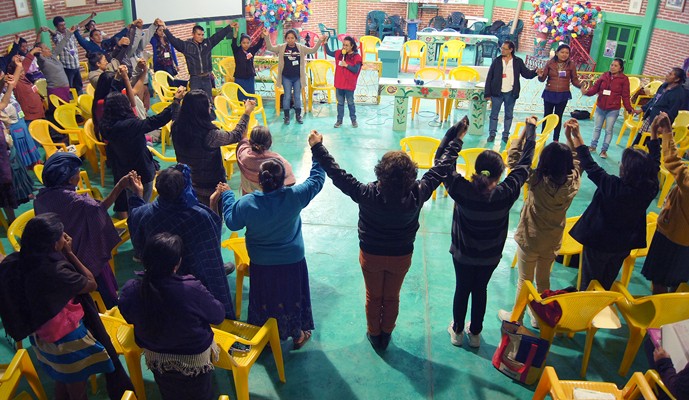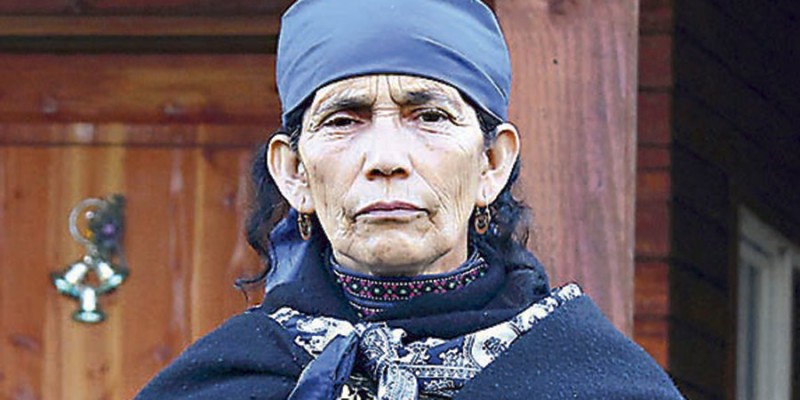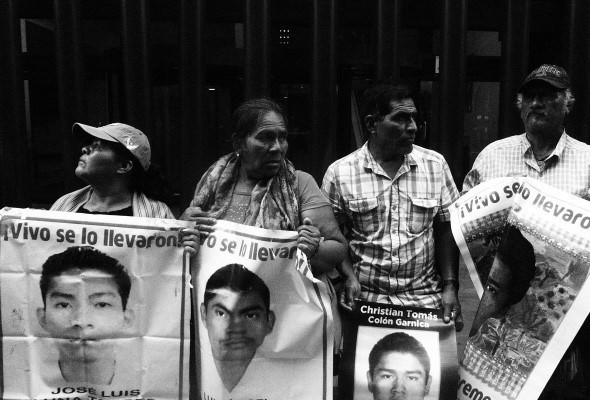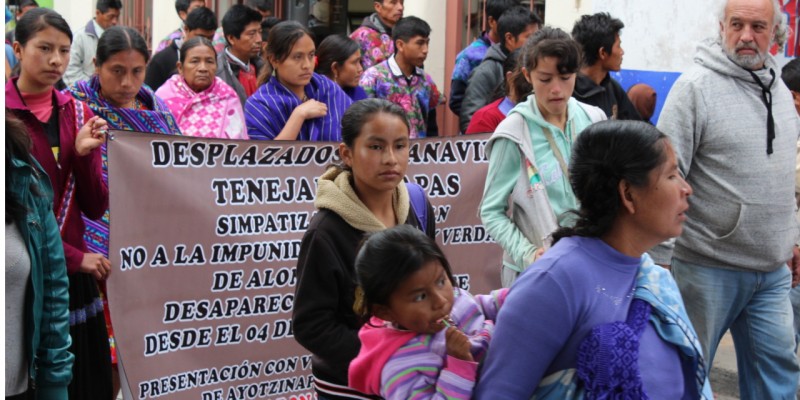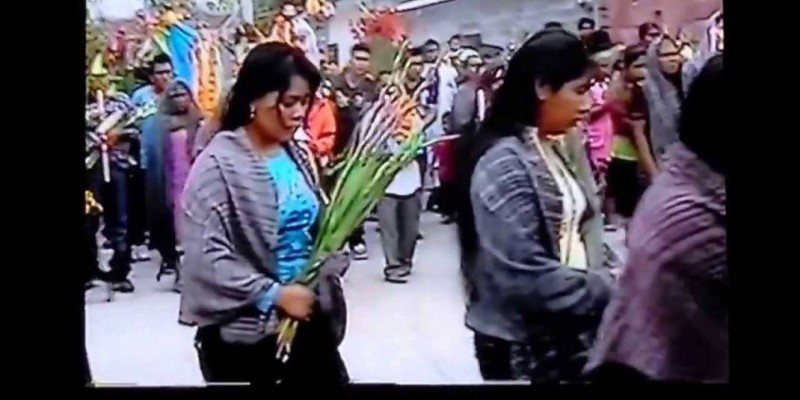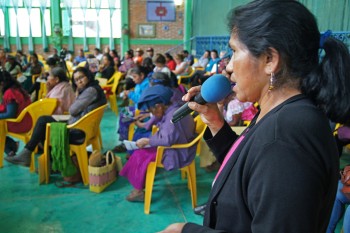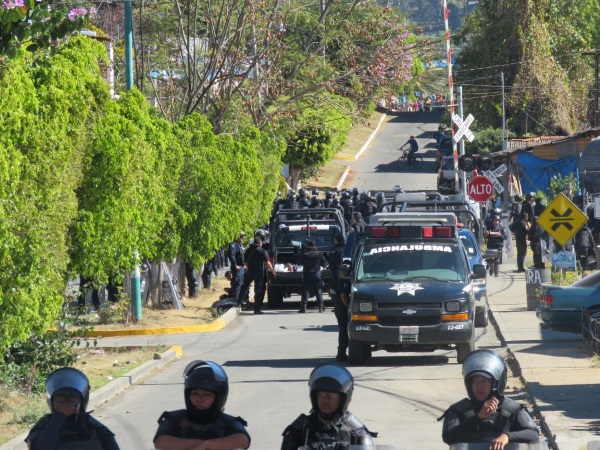
(Español) Un encuentro de mujeres “Abajo a la izquierda… desde adentro y con todo el corazón”
San Cristóbal de las Casas, Chiapas.
9 de marzo, 2017.
Por: Concepción Suárez Aguilar (para Radio Zapatista)
Abajo a la izquierda… desde adentro y con todo el corazón
¡Tenemos derecho a la tierra, tenemos derecho a decidir!
Rostros varios, ojos limpios, voces fuertes, mujeres indígenas y no indígenas reunidas en asamblea del Movimiento en Defensa de Tierra y Territorio y por el Reconocimiento a la Participación de las Mujeres en la Toma de Decisiones, este 6 y 7 de marzo en las instalaciones de CIDECI Las Casas, abrimos nuestros corazones, compartimos nuestras rabias frente al despojo, el que viene de los proyectos neoextractivistas, pero también el que viene de los hombres del campo y la ciudad.
Communique from the National Indigenous Congress
Traduzione italiano
Tradução em portugês
::::::::::::::::::::::::::::
Communique from the National Indigenous Congress
March 9, 2017
To the national and international Sixth
To the free media
To civil society in general
Compañeros, compañeras, as our peoples continue to organize ourselves, each in our own ways and forms, analyzing and making agreements in order to form a Concejo Indígena de Gobierno [Indigenous Council of Government], the war against our peoples doesn’t stop. The three levels of bad government continue to act against our mother earth, our peoples, and our autonomous organizations through plunder and repression.
In the state of Oaxaca
We denounce and condemn with outrage the events in the community of San Francisco del Mar in the Isthmus of Tehuantepec region, Oaxaca, where violent actions were carried out, including the use of firearms, in order to try to impose approval of wind power projects that would dispossess the community of a good part of their common use lands and seriously affect the rich and delicate ecosystem there.
These events unfolded during the assembly of the comisariado de bienes comunales [communal resources or the commons] of San Francisco del Mar which was convoked to discuss authorization of the use of over 15,000 hectares for shrimping projects in Pueblo Viejo in the zone known as bocabarra. Various speakers expressed their opposition to the authorization, giving evidence that its true purpose was for wind power projects. They explained that bocabarra is a vital area for thousands of fishermen, that approval of the project would remove their source of livelihood, and that such an important decision required the participation and decision of the whole population.
Bocabarra is part of the Isthmus lagoon system and a vitally important area for its role as a key fishing zone and for its sacred and spiritual sites. In this part of the region, fishing provides the most important source of economic livelihood and food for the population. It is also a highly coveted zone for wind power companies because of its powerful winds, and there has already been an attempt by Mareña Renovables to construct a wind power plant in the Barra of Santa Teresa which provoked large mobilizations in opposition from the surrounding communities.
It is necessary to add that what happened in San Francisco del Mar is not an isolated event but rather a comprehensive plan of plunder and dispossession to be applied to the territories of the communities of the Isthmus in order to allow the imposition of megaprojects in the region via the Special Economic Zone of the Tehuantepec Isthmus [ZEE by its Spanish acronym] which undergirds this second phase of wind power development.
In the state of Michoacán
On February 24, in the community of Calzonzin, the bad government of the state of Michoacán in complicity with the federal government savagely repressed the P’urhépecha people of Caltzontzin who were protesting in defense of their right to restitution of communal territory.
That day the repressive forces of the Mexican State laid siege to the community of Caltzontzin, not allowing anyone to enter or exit, and then proceeded to launch tear gas bombs from a helicopter over the community and invaded community territory to arbitrarily arrest 17 community members, of which 13 are still being held and one of which is mentally disabled. At the same time, they entered various homes in the community without search warrants, destroying what they found and violating human rights in their mission to defend the privileges of the transnational railroad company Kansas City Southern.
We demand the immediate release of the political prisoners of the originary peoples of Michoacán, in particular the 13 community members detained in Caltzontzin whose only crime is the defense of communal property, of dignity, and of life for their communities and for future generations.
On the coast, the Nahua community of Santa María Ostula is under attack by criminal organizations which have penetrated the territory to the southeast of the municipality of Aquila and, through death and looting, attempt to dismantle the community’s autonomous organization and community security in order to bring back to the area terror and the extraction and exploitation of natural resources and communal lands.
On February 5 of this year, five community police from San Pedro Naranjestil, to the south of the municipality of Aquila affiliated with the municipal police, were kidnapped by members of the Marines who later turned them over to the organized crime groups led by Jesús Cruz Virrueta (alias Chuy Playas), Fernando Cruz Mendoza (alias El Tena), José María Cruz (alias el Tunco), Federico González Medina (alias Lico) and Mario Álvarez López (alias El Chacal). This act has been followed by actions impeding operations by the self defense groups of the Aquila, Chinicuila, and Coahuayana municipalities to detain members of organized crime.
To the former we must add the frequent instances in which the armed forces of the bad government have acted in coordination with criminal gangs against the indigenous community of Santa María Ostula, which has contributed to the collective grief and the demand for justice for the 34 community members who were murdered and the 5 who are disappeared.
In the state of Querétaro
The bad government is unjustly holding prisoner the indigenous Ñhañhú compañero Raymundo Pascual García, of San Ildefonso, Amealco, Querétaro, who was detained along with other compañeros for participating with his community in the protests against the gas hikes. We also denounce the continued plunder of the lands of the Fundo Legal of the Galeras and La Peñuela communities in the municipality of Colón though the corrupt actions of the bad governments and political parties.
As a consequence, the peoples, nations, and tribes who make up the National Indigenous Congress declare that:
- We hold the municipal president and the commissioner of the bienes comunales of San Francisco del Mar responsible for the violent acts in Ikoot territory and the attempt at land dispossession. We denounce the complicity between well known state and federal authorities and politicians and we demand clarification of the events and punishment of those responsible for the shots fired during the assembly. We demand respect for the legitimate right of the people of San Francisco del Mar to determine the destiny of their lands and natural resources.
- We demand that the autonomy and communitarian organization of Santa María Ostula be respected. We demand the arrest of Jesús Cruz Virrueta (alias Chuy Playas), Fernando Cruz Mendoza (alias El Tena), José María Cruz (alias el Tunco), Federico González Medina (alias Lico), and Mario Álvarez López (alias El Chacal), the dismantling of the political and economic structure that sustains them, the punishment of the soldiers and politicians responsible for the murder of the child Hidelberto Reyes Garcia and all of the murdered community members, the cancellation of arrest warrants for the [community police] commanders in Ostula and the Sierra Costa region, the return of the disappeared, and absolute respect for the communal territory of Ostula.
- We demand immediate and absolute freedom for the compañero Raymundo Pascual García from San Ildefonso, Amealco, Querétaro, who was detained for protesting with his community against the gas hikes imposed by the bad government, a halt to land dispossession in the communities of Galeras and La Peñuela in the municipality of Colón, Querétaro, and punishment of those responsible for the unjust imprisonment of over 3 years of the Ñhañhu indigenous compañeras of Amealco, Querétaro, Jacinta Francisco Marcial, Alberta Alcántara Juan and Teresa González.
We say to our brothers and sisters of the Ikoot, P´urhépecha, Nahua and Ñhañu peoples in these regions and the rest of the country who everyday sustain our hope, rebellion, and dignity with their struggle: you are not alone. In the colors, tongues, and geographies that make up the CNI, we are you; your yearning for justice is ours, your pain is ours, and your demand, which brings into bloom the birth of another world, is our heart and our unwavering certainty.
Until dignity becomes tradition
Freedom for all of the political prisoners
Return of the disappeared
Justice for San Francisco del Mar
Justice for Calzonzin
Justice for Santa María Ostula
Justice for the Ñhañu people of Querétaro
Attentively,
For the Full Reconstitution of Our Peoples
Never Again a Mexico Without Us
March 2017
National Indigenous Congress
